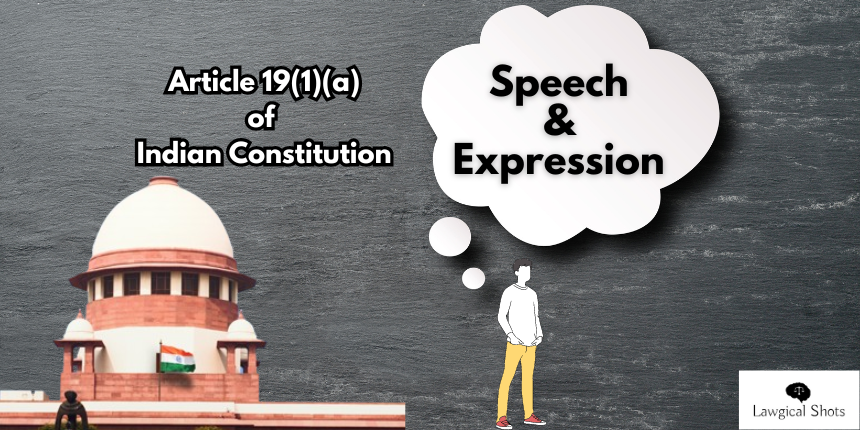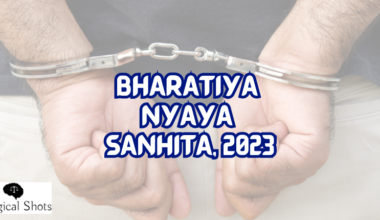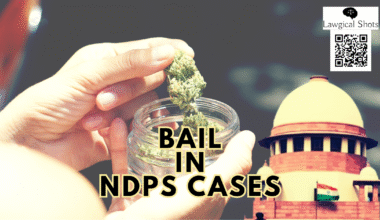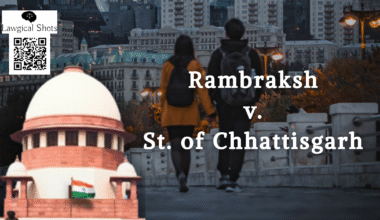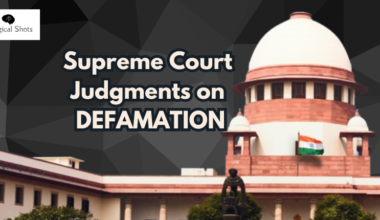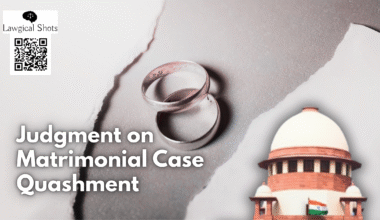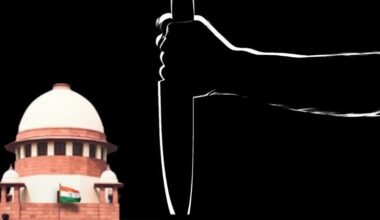Article 19(1)(a) of the Constitution of India guarantees to the citizens of India the freedom of Speech and Expression, which lays the foundation of all democratic nations. Article 19(1)(a) guarantees every citizen the right to express one’s views or ideas by words of mouth, writing, printing, pictures or any other medium of expression. It is also considered a “bulwark” of a healthy, progressive and democratic society. While the exact provision under the Constitution is limited to speech and expression, the Supreme Court of India has time and again interpreted the concept to expanded through landmark cases on Article 19(1)(a) of Indian Constitution, while upholding its true essence.
Rights under Article 19(1)(a) of Indian Constitution
The freedom of speech and expression under Article 19(1)(a) includes the following :
1. Freedom of Press
2. Commercial Speech
3. Demonstration/ Strikes
4. Right to Know
5. Right to Reply
6. Right to Fly National Flag
7. Right to Telecast
Landmark Cases on Article 19(1)(a) of Indian Constitution
The Indian judiciary has played a crucial role in interpreting and upholding the right to freedom of speech and expression, as enshrined in Article 19(1)(a) of the Constitution of India. Here are some of the Supreme Court judgments on Article 19(1)(a) of the Constitution.
FREEDOM OF PRESS
Bennett Coleman V Union Of India, AIR 1972 SC 106
The Supreme Court famously described the freedom of the Press as the “Ark of the Covenant of Democracy,” meaning that it is a fundamental safeguard for maintaining the essence of a democratic society. A free and unfettered press is crucial for an informed citizenry and is essential for the functioning of democracy.
- Violation of Article 19(1)(a): The Supreme Court held that the restrictions on newsprint import amounted to a direct violation of the freedom of speech and expression. It emphasized that freedom of Press is an essential part of the right to free speech and that any control over the medium of communication (in this case, newsprint) affects the dissemination of information, thus restricting free speech.
- Independence of the Press: The Court noted that the government cannot limit or control the volume of news content under the guise of economic regulations. Press freedom includes not only the right to publish but also the right to circulation and dissemination of information without unnecessary state interference.
- Unreasonable Restrictions: The restrictions imposed by the government were deemed unreasonable as they interfered with the right to publish freely, even if such regulations claimed to serve economic purposes. The Court emphasized that restrictions on the media must not be arbitrary or excessive.
Sakal Papers Pvt. Ltd. v. Union of India, 1962 AIR 30
The Supreme Court considered the constitutionality of the statute regulating the number of pages in newspaper based on price charged.
- Decision: The Apex Court held that the freedom of speech and expression guaranteed by Art. 19(1)(a) included the freedom of the press. For propagating ideas, a citizen had the right to publish them, disseminate them and circulate them, either by word of mouth or by writing. The right extended not merely to the matter which he was entitled to circulate but also to the volume of circulation. Since the impugned Act interfered with the circulation, it violated the freedom of speech and expression under Article 19(1)(a) of the Constitution. The Court made it clear that the Government could not restrict Freedom of speech for the purpose of regulating commercial aspect of the activities of newspapers.
Brij Bushan v State of Delhi, AIR 1950 SC 129
The matter pertained to the constitutionality of Pre-Censorship by the Government.
- Pre-censorship a Violation of Free Speech: Supreme Court held that the order of pre-censorship on a journal was unconstitutional as it imposed an unreasonable restriction on the freedom of Press under Article 19(1)(a). The Court declared that such censorship cannot be justified on the grounds of maintaining public order, unless there is a clear and immediate threat of violence or disorder.
- Public Order and Free Speech: The Court pointed out that public order cannot be used as a broad justification for imposing prior restraints on speech, especially when there is no immediate evidence that the speech would incite violence or disrupt public peace.
- Restrictions on Speech Must Be Reasonable: The Court emphasized that any restriction under Article 19(2) must be reasonable and proportionate to the need for maintaining public order. In this case, the government’s action of prior restraint was deemed excessive and unnecessary.
FREEDOM OF CIRCULATION
Romesh Thappar v State of Madras, AIR 1950 SC 124
The Supreme Court held that the freedom of speech and expression includes not just the right to express one’s views but also the right to circulate those views to a wider audience. It emphasized that the ability to disseminate ideas is an essential part of free speech, and any restriction on the circulation of publications directly impacts this right. The Apex Court held that Freedom of Circulation is Integral to Free Speech. It emphasized that the ability to disseminate ideas is an essential part of free speech, and any restriction on the circulation of publications directly impacts this right.
- Narrow Interpretation of Public Order (Before First Amendment): At the time, Article 19(2) only permitted restrictions on the freedom of speech in the interests of the security of the state or in relation to actions that undermine the state’s authority to maintain public order. The Court found that “public safety” as interpreted in the Madras Maintenance of Public Order Act was broader than “security of the state” as provided in Article 19(2), and thus, the law went beyond what the Constitution allowed. Consequently, the restriction was declared unconstitutional.
- Striking Down the Madras Act: Since the restriction could not be justified under the narrow grounds of Article 19(2), the Court struck down the Madras Maintenance of Public Order Act as violating the right to free speech and expression. The Court held that a restriction on circulation imposed for the purpose of “public safety” without a clear and immediate threat to state security was not permissible under Article 19(2).
COMMERCIAL SPEECH
Tata Press Ltd. v MTNL, AIR 1995 SC 2438
The Supreme Court held that advertising which is no more than a commercial transaction, is nonetheless dissemination of information regarding the product advertised, since the public at large is benefitted by the information made available through the advertisement. According to the Court, in a democratic country, the free flow of commercial information is indispensable.
- Background of the Case: Tata Press Ltd., a private company, published a telephone directory containing advertisements for various services. The Mahanagar Telephone Nigam Ltd. (MTNL) sought to restrain Tata Press from publishing any advertisements in the directory, claiming that such ads could mislead the public and that MTNL had exclusive rights over the directory.
- Commercial Speech as a Form of Expression: The Supreme Court recognized commercial speech—the communication of information related to commercial activities, such as advertisements—as a form of speech protected under Article 19(1)(a). Such a right cannot be denied by creating a monopoly in favour of the government or any other authority. The Court emphasized that commercial speech is important for the functioning of a free market economy and benefits consumers by providing information about products and services.
- Reasonable Restrictions: While the Court affirmed that commercial speech is protected, it also held that this right is subject to reasonable restrictions under Article 19(2). The restrictions must be justified and cannot be arbitrary, unreasonable, or excessively broad.
- Decision: The Court ruled in favor of Tata Press, allowing it to publish the directory with advertisements, as the restrictions imposed by MTNL were found to be unjustified. The Court emphasized that consumers have the right to receive information about services and products, which is essential for making informed choices.
DEMONSTRATION/ STRIKES
Kameshwar Prasad v State of Bihar, AIR 1962 SC 116
The Supreme Court while dealing with the constitutionality of provisions of Bihar Government Servants Conduct Rules, 1956 held that orderly demonstration being visible expression of ideas come within the ambit of Article 19(1)(a). However, the court held that acts of resorting to strike or bandhs is not protected under Article 19(1)(a).
- Unreasonable Restriction: The Court found that the disqualification imposed on Government Servants from participating in demonstrations constituted an unreasonable restriction on their freedom of speech. The Act was deemed to infringe upon the rights of Government Servants.
- Decision: The Supreme Court ruled that the disqualification was unconstitutional as it violated Article 19(1)(a) and struck down the relevant provisions of the Bihar Government Servants Conduct Rules, 1956 that restricted the freedom of speech of Government Servants.
RIGHT TO KNOW
Prabha Dutt v. Union Of India, AIR 1982 SC 6
The Supreme Court demonstrated the right of a journalist seeking permission to interview a death-row convict. The Court held that the freedom of Press does not extend to an absolute right to interview individuals, including prisoners or death-row convicts. The state has the authority to deny such requests based on reasonable grounds.
The Supreme Court of India laid down that the freedom of speech and expression includes within its ambit the right to know.
- Background of the Case: The petitioner, Prabha Dutt, sought permission to interview a death-row convict. The prison authorities denied this request, citing concerns about maintaining prison discipline and security.
- Freedom of Press: The Supreme Court recognized that freedom of the press is a crucial aspect of the right to freedom of speech and expression. The Court emphasized that journalists have the right to gather information and report on matters of public interest.
- Not an Absolute Right: However, the Court clarified that this right is not absolute. It can be subject to reasonable restrictions, especially when it involves sensitive issues like interviews with prisoners.
- Decision: The Court upheld the authority of prison officials to deny the interview request, ruling that maintaining prison discipline and security was a valid ground for imposing restrictions on the press. The Court concluded that the refusal to allow the interview was justified and did not violate the freedom of speech and expression.
RIGHT TO REPLY
L.I.C v. Manubhai D. Shah, (1992) 3 SCC 637
The Supreme Court held that the phrase ‘Freedom of Speech and Expression’ includes the freedom to circulate and propagate views through any media subject to reasonable restrictions. More importantly the court held that this right extends to use the media to reply the criticism leveled against one’s propagated view.
- Background of the Case: Manubhai D. Shah, the executive trustee of the Consumer Education & Research Centre Ahmedabad undertook research into working of the Life Insurance Corporation of India (LIC) published and circulated a study paper titled “A fraud on policy holders-a shocking story” questioning the unduly high premiums charged by LIC. The same was challenged through a paper by LIC published in The Hindu. A rejoinder was published by the petitioner in the same newspaper. A counter paper was published in LIC’s magazine ‘Yogakshema’, and Manubhai requested LIC to publish his response in the same magazine to present a complete picture to the reader. The said request was rejected by LIC Manubhai filed a writ petition against LIC’s stand of it being an In-House magazine.
- Right to Expression: The Supreme Court recognized that freedom of speech and expression includes the right to express views and opinions regarding public policies, especially by agents of public sector organizations. The Court emphasized the importance of allowing employees in public organizations to voice their concerns without fear of reprisal.
- Unreasonable Restrictions: The Court held that the denial of publication of Manubhai’s rejoinder was an unreasonable restriction on his right to free speech. The judgment underscored that while organizations have the right to maintain discipline, they cannot curb others’ rights to express opinions on issues affecting the public.
- Decision: The Supreme Court ruled in favor of Manubhai D. Shah. The Court highlighted that public sector undertakings should encourage healthy discussion and debate on policies rather than suppress dissenting views.
RIGHT TO FLY NATIONAL FLAG
Union of India v Naveen Jindal, AIR 2004 SC 1559
The right to fly the national flag was recognized as a form of expression within the ambit of Article 19(1)(a).
- Background of the Case: Naveen Jindal, the then Joint MD of a public limited company, filed a petition challenging the restrictions imposed by the Flag Code of India and the Emblems and Names (Prevention of Improper Use) Act, 1950, which prohibited private individuals from flying the national flag.
- Freedom of Expression: The Supreme Court recognized that the right to fly the national flag is a form of expression that is protected under Article 19(1)(a). The Court emphasized that this right is an important aspect of expressing national pride and patriotism.
- Legitimate Restrictions: While acknowledging that the State can impose reasonable restrictions on the right to freedom of speech and expression under Article 19(2), the Court held that the restrictions in this case were unreasonable and arbitrary. The Court noted that the ban on flying the national flag by private individuals was not justified.
- Decision: The Supreme Court ruled in favor of Naveen Jindal, declaring that private citizens have the right to fly the national flag. The Court instructed the Union Government to amend the relevant laws to reflect this right while maintaining respect for the flag.
The landmark cases on Article 19(1)(a) of Indian Constitution have been compiled and summarised by Mr. Raman Verma, who is amazingly polishing his research and writing skills while interning at Lawgical Shots.
